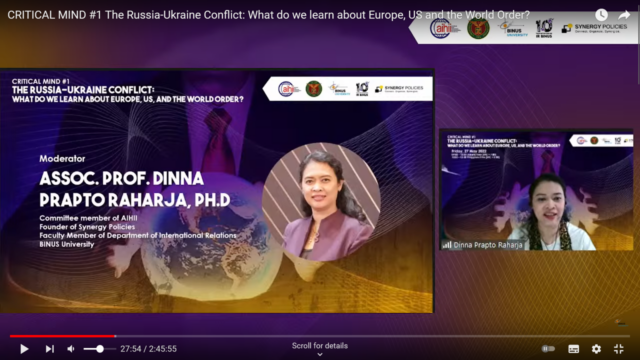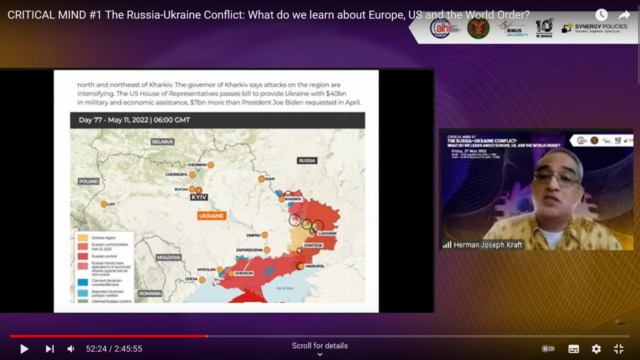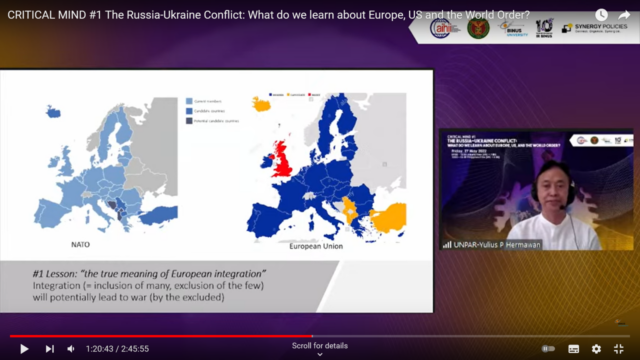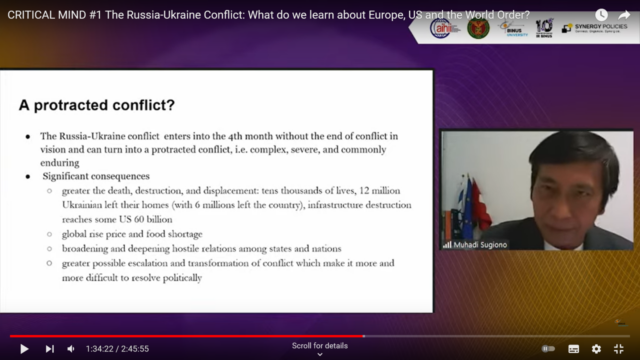The Russia-Ukraine Conflict: What do we learn about Europe, US and the World Order?
In May 27th 2020, The Indonesian International Relations Association (AIHII, Asosiasi Ilmu Hubungan Internasional Indonesia) in collaboration with the Department of Political Science University of Philippines Diliman, Binus University Jakarta & Synergy Policies (an independent think-tank for interdisciplinary approach) organized a discussion under the platform CRITICAL MIND. CRITICAL MIND is the platform for scholars of international relations from different walks of experience to reflect on the world order that we live in: the power distribution, the social justice, the human rights, the respect and tolerance among nations, and the humanity. This event is also part of the 82nd International Relations Lecture Series from the Department of International Relations at BINUS University.

In this first discussion, entitled “The Russia-Ukraine Conflict: What do we learn about Europe, US and the World Order?“, a lot has been written about the Russia-Ukraine conflict. Granted it is a tragic event for humankind; one that causes pain to any countries fighting for peace, justice, and humanity. But we need to look beyond what being said and told by the leaders and the media. What has changed in the US, Europe and the world given the Russia-Ukraine conflict? Is the potential of World War III tamed so far? What don’t we know about the ongoing negotiations between countries, both in the political security and socio-economic dimensions? What is the take home points for students of international relations in Southeast Asia?

In the discussion, Prof. Herman Joseph S Kraft, MA, the Chair of the Department of Political Science, University of Philippines, Diliman, as the main speaker, elaborate the issue by showing the attitude of the European Union towards Russia which is quite complicated. The EU is experiencing a number of internal problems, such as Poland’s dependence on Russia and the development of an authoritarian (right-wing) regime in the country and a number of other EU member states. On the other hand, the European Union is also considered to be indecisive in its actions, considering that Germany, as the most dominant country in the European Union, refuses to send Ukraine lethal weapons assistance.

However, the Russia-Ukraine conflict also has the potential to increase the role of the European Union strategically with NATO in regional security issues. This has expanded the EU’s military tool box, increasing interoperability between forces, and flexible arrangement for deployments alongside NATO’s. In addition, in relation to ASEAN, there might be renewed interest in strengthening US-ASEAN ties as part of America’s “Indo-Pacific Strategy”. This is in comparison to America’s earlier priorities in formalizing the QUAD and forming AUKUS.

Moderated by Assoc. Prof. Dinna Prapto Raharja, Ph.D., committee member of AIHII, founder of Synergy Policies and faculty member of Department of International Relations at BINUS University, and discussed by Yulius Purwadi Hermawan, Ph.D. (Board of Expert to AIHII, Faculty member of the International Relations Department of Universitas Parahyangan in Bandung) and Muhadi Sugiono, MA (Member of AIHII, Faculty member of the International Relations Department Universitas Gadjah Mada in Yogyakarta, Indonesia) as discussants, this discussion provides enlightening insight into this heated issue.
Follow the complete discussion on the YouTube link: https://www.youtube.com/watch?v=bF01uXG8DM0


